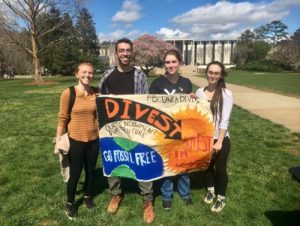Students: Keep Up the Pressure
It isn’t easy being a college student in 2020. After the Coronavirus halted spring semesters, the normal rhythm of the academic year has been disrupted and does not seem set to return entirely to normal anytime soon. For many, this means continuing their work for change and justice on campus at a time in the nation’s history when those efforts have rarely been more critical.
 Students, wielding power both on their campuses and in their communities, have often acted as a catalyst for change. In 1960, a group of four black students in Greensboro, North Carolina decided to take a seat at the lunch counter of the local Woolworth’s. Within three days, joined by women from nearby Bennett College, the students, all of whom were teenagers had attracted nearly 300 others to their cause and sparked more than fifty other similar protests across the south over the course of the following summer. The actions of those students in Greensboro ultimately caused a chain of events that resulted in both the creation of the Student Nonviolent Coordinating Committee and the passage of the Civil Rights Act of 1964.
Students, wielding power both on their campuses and in their communities, have often acted as a catalyst for change. In 1960, a group of four black students in Greensboro, North Carolina decided to take a seat at the lunch counter of the local Woolworth’s. Within three days, joined by women from nearby Bennett College, the students, all of whom were teenagers had attracted nearly 300 others to their cause and sparked more than fifty other similar protests across the south over the course of the following summer. The actions of those students in Greensboro ultimately caused a chain of events that resulted in both the creation of the Student Nonviolent Coordinating Committee and the passage of the Civil Rights Act of 1964.
 More recently, students across the country have been pressing their universities to tackle the Climate Crisis by divesting from the fossil fuel industry. To date, 1244 institutions have divested from fossil fuels totaling nearly $15 trillion in lost revenue. The work is hard, many campaigns fail, or take years to achieve their goal, but during a time when the US government has consistently avoided taking meaningful action on climate change, student and youth activists across the country have shown the country the path forward.
More recently, students across the country have been pressing their universities to tackle the Climate Crisis by divesting from the fossil fuel industry. To date, 1244 institutions have divested from fossil fuels totaling nearly $15 trillion in lost revenue. The work is hard, many campaigns fail, or take years to achieve their goal, but during a time when the US government has consistently avoided taking meaningful action on climate change, student and youth activists across the country have shown the country the path forward.
Students will be watching how their schools respond, or don’t, to the protests against police violence and racial inequities on their own campuses this fall. Earlier in the summer, students at Ole Miss celebrated the removal of a confederate monument on campus after state and administration officials finally relented following a long campaign from students and faculty to have it removed. Confederate statues at other universities have met less ceremonious ends. In the wake of the shooting of Jacob Taylor, over 600 professors across the country are set to engage in a wildcat strike protesting police violence.
Now that fall semesters are beginning, amidst multiple national crises and a looming historic Presidential election, students are left to figure out how to navigate the new normal of their academic lives and what their role in this historic moment is. In the wake of the economic fallout from the pandemic, universities across the country are embracing austerity measures that target low-wage campus workers, academic programs, and student initiatives, such as those put in place to protect vulnerable students. In August, the country was given a window into its climate future as increasingly powerful hurricanes struck the coasts and climate-fueled wildfires left California smoldering. To cap it all off, the country remains in the midst of a Presidential election that both participants are characterizing as a battle for the very soul of the nation, while the incumbent actively sabotages democratic systems and threatens the very legitimacy of the election.
For students still trying to figure out their role in this moment, look back to see the way forward. Change is possible, even in the most grim circumstances. Keep up the pressure, support each other, and make your voices heard in every way that you can. Maybe 2020 can end a little better than it started.
 Mackay Pierce, Associate Director
Mackay Pierce, Associate Director
[email protected]
202-380-3441






